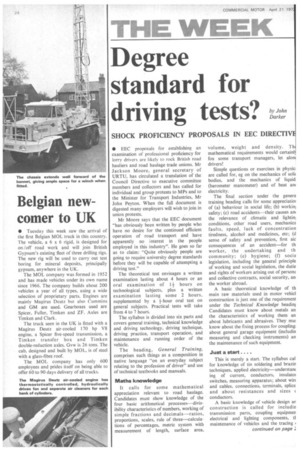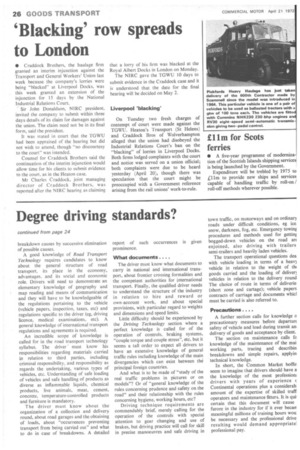Degree standard for driving tests?
Page 26

Page 28

If you've noticed an error in this article please click here to report it so we can fix it.
SHOCK PROFICIENCY PROPOSALS IN EEC DIRECTI
• EEC proposals for establishing an examination of professional proficiency for lorry drivers are likely to rock British road hauliers and road haulage trade unions. Mr Jackson Moore, general secretary of URTU, has circulated a translation of the Council Directive to executive committee members and collectors and has called for individual and group protests to MPs and to the Minister for Transport Industries, Mr John Peyton. When the full document is digested many employers will wish to join in union protests.
Mr Moore says that the EEC document "has obviously been written by people who have no desire for the continued efficient operation of road transport and have apparently no interest in the people employed in this industry". He goes so far as to claim: "Quite obviously people are going to require university degree standards before they will be capable of attempting a driving test."
The theoretical test envisages a written examination lasting about 4 hours or an oral examination of 1+ hours on technological subjects, plus a written examination lasting some 2 hours, supplemented by a +-hour oral test on general subjects. Practical tests will take from 4 to 7 hours.
The syllabus is divided into six parts and covers general training, technical knowledge and driving technology, driving technique, driving practice, transport operation, and maintenance and running order of the vehicle.
The heading, General Training, comprises such things as a composition in native language "on an everyday subject relating to the profession of driver" and use of technical textbooks and manuals.
Maths knowledge
It calls for some mathematical appreciation relevant to road haulage. Candidates must show knowledge of the four basic arithmetical processes—divisibility characteristics of numbers, working of simple fractions and decimals—ratios, proportions, scales, rule of three—calculations of percentages, metric system with measurement of length, surface area, volume, weight and density. Th mathematical requirements would certainl fox some transport managers, let alom drivers!
Simple questions or exercises in physic. are called for, eg on the mechanics of soli( bodies, and the mechanics of liquid (barometer manometer) and of heat am electricity.
The final section under the genera training heading calls for some appreciatiol of (a) behaviour in social life; (b) workim safety; (c) road accidents—their causes am the relevance of climatic and lightim conditions, other road users, mechanica faults, speed, lack of concentration tiredness, alcohol and medicines, etc; (d sense of safety and prevention, first ak consequences of an accident—for th worker, the undertaking and th community; (e) hygiene; (f) socia legislation, including the general principle of working and social legislation, the dutie and rights of workers arising out of persona and collective contracts, social security, an the worker abroad.
A basic theoretical knowledge of th main raw materials used in motor vehicl construction is just one of the requirement
under the Technical Knowledge headim Candidates must know about metals an
the characteristics of working them an about lubricants and abrasives. They mm know about the fixing process for coupling about general garage equipment (includin measuring and checking instruments) an the maintenance of such equipment.
Just a start....
This is merely a start. The syllabus cal for knowledge of tin soldering and brazin techniques, applied electricity—understam ing of current, conductors; irtsulatoi switches, measuring apparatus; about win and cables, connections, terminals, splice and about resistances and sizes ( conductors.
A basic knowledge of vehicle design ar construction is called for includin transmission parts, coupling equipmer electrical and lighting components, ti maintenance of vehicles and the tracing breakdown causes by successive elimination of possible causes.
A good knowledge of Road Transport Technology requires candidates to know about the general structure of road transport, its place in the economy, advantages, and its social and economic role. Drivers will need to demonstrate an elementary knowledge of geography and map reading and means of communication and they will have to be knowledgeable of the regulations pertaining to the vehicle (vehicle papers, inspection, taxes, etc) and regulations specific to the driver (eg, driving licence, medical examinations, etc). A general knowledge of international transport regulations and agreements is required.
An incredible scope of knowledge is called for in the road transport technology syllabus. The driver must know his responsibilities regarding materials carried in relation to third parties, including criminal responsibility, and responsibility as regards the undertaking, various types of vehicles, etc. Understanding of safe loading of vehicles and safe handling of products as diverse as inflammable liquids, chemical products, live animals, meat, cement, concrete, temperature-controlled products and furniture is mandatory.
The driver must know about the organization of a collection and delivery round, about road garages and the obtaining of loads, about "occurrences preventing transport from being carried out" and what to do in case of breakdowns. A detailed report of such occurrences is given prominence.
What documents . . .
The driver must know what documents to carry in national and international transport, about frontier crossing formalities and the competent authorities for international transport. Finally, the qualified driver needs to understand the structure of the industry in relation to hire and reward or own-account work, and about special provisions, with particular regard to weights and dimensions and speed limits.
Little difficulty should be experienced by the Driving Technology section where a perfect knowledge is called for of the operation of controls, braking systems, "couple torque and couple stress", etc, but it seems a tall order to expect all drivers to have an extensive knowledge of general traffic rules including knowledge of the main divergencies which can exist between the principal foreign countries.
And what is to be made of "study of the real traffic problems in pictures or on models"? Or of "general knowledge of the rules concerning prudence and safety on the road" and their relationship with the rules concerning hygiene, working hours, etc?
Driving technique requirements are commendably brief, merely calling for the operation of the controls with special attention to gear changing and use of brakes, but driving practice will call for skill in precise manoeuvres and safe driving in town traffic, on motorways and on ordinary roads under difficult conditions, eg ice snow, darkness, fog, etc. Emergency towing procedures and methods used for getting bogged-down vehicles on the road art enjoined, also driving with trailers semi-trailers and heavily laden vehicles.
The transport operational questions dea with vehicle loading in terms of a heavl vehicle in relation to the weight of thl goods carried and the loading of deliver! vehicles in relation to the delivery round The choice of route in terms of deliverie (short zone and cartage); vehicle papers contracts of carriage and documents whicl must be carried is also referred to.
Precautions. . . .
A further section calls for knowledge c precautionary measures before departurt safety of vehicle and load during transit an delivery of goods and acceptance by client.
The section on maintenance calls fc knowledge of the maintenance of the mai working parts, tracing and describin breakdowns and simple repairs, applyin technical knowledge.
In short, the Common Market boffir seem to imagine that drivers should have a the knowledge of the most profession drivers with years of experience Continental operations plus a considerab amount of the expertise of skilled traff operators and maintenance fitters. It is qui, certain that this document will cause furore in the industry for if it ever becatr meaningful millions of training hours wou be necessary and the professional drive resulting would demand appropriate] professional pay.












































































































